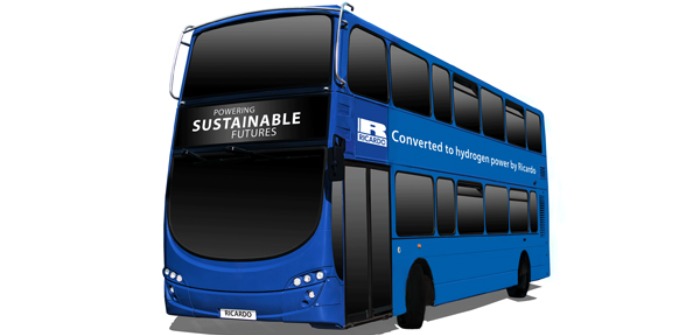Having received funding from the UK government, powertrain developer and engineering consultant Ricardo has announced it will build a retrofit hydrogen fuel cell bus demonstrator, destined for the country’s first hydrogen transport hub based in northeast England.
The Tees Valley Hydrogen Hub was launched by the UK government to demonstrate the country’s hydrogen strategy, followed by the launch of the Hydrogen Transport Hub Demonstration competition for companies to present viable hydrogen transport technology solutions.
Ricardo submitted a bid with public transport operator Stagecoach for a retrofit hydrogen fuel cell bus. The UK government’s Department for Transport named the bid as one of the competition winners, resulting in a funding award to produce a one-off demonstration vehicle for use in February 2022 at the Tees Valley Hydrogen Hub.
“Stagecoach has invested more than £1bn [US$1.4bn] in greener buses in the past decade and is fully committed to reducing its environmental impact,” explained Steve Walker, northeast managing director at Stagecoach. “Our collaboration to help with technical knowledge and extensive driver testing for the inception of this new technology is a further demonstration of our desire to help [slow down] climate change.”
At present, 38,000 buses serve routes all over the UK. Although half of them are less than eight years old, 98% of them are diesel powered, meaning the government needs a long-term, sustainable solution to achieve net zero transport targets.
“National and local government authorities across the UK are bringing forward their zero-emissions targets to 2030,” commented Teri Hawksworth, managing director of Ricardo’s automotive and industrial division. “This creates challenges for bus operators who, while still grappling with the financial challenges of the global pandemic, are committed to transitioning to zero-emission vehicles. Winning the Hydrogen Transport Hub Demonstration competition will enable us to promote hydrogen fuel cell capabilities for buses in the UK and mainland Europe, and demonstrate the environmental, societal and economic benefits of the circular economy: affordably achieving zero emissions while extending vehicle lives through retrofitting rather than scrapping vehicles.”
Through the project, Ricardo says it intends to develop a scalable and modular solution, enabling the company’s system to be adapted into single- and double-decker buses. Furthermore, the platform may be sold as a new fuel cell module to coach builders in Europe. This will enable them to develop new fuel cell buses by combining a rolling chassis, a coachbuilder’s body and Ricardo’s fuel cell module.


